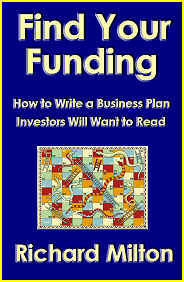| |
What is a business plan?
A business plan is a report that you,
or your business adviser, draws
up
before launching your new business
or new product.
It takes a hard look at every aspect
of your planned venture to make sure
that you are being as
realistic
as possible in your projections and that
you have covered every
foreseeable
issue that you may have to deal with.
Your business plan is your overall
strategic plan
for the next 12 to 24
months and also contains important
components such
as your cash flow
forecasts and your marketing plan.
Why do you need a business plan?
Your plan serves a number of
important purposes. First it is
your own
roadmap in deciding and implementing
details of products, or
services,
personnel, costs, marketing, and
everything else connected
with your new
venture.
Second, your business plan is a key
document if
you are seeking financial
backing from a bank, or investment
from venture
capitalists.
Third, your business plan is your
benchmark or
yardstick for measuring
how well your new company is
performing during
its formative stages.
When do you need your Business
Plan?
It's fine to start sketching out your ideas
and getting them down on
paper from
the start - even if it's only the back of a
restaurant
napkin.
And by all means discuss your ideas
with your
friends and family. But it's a
big mistake to show anyone who might
be
interested in backing you financially
your plans until they have been
professionally prepared. There are two
reasons for this
advice. The first is that
it is not reasonable to expect other
people to be able to visualise a finished
conception from your rough sketches.
They are more likely to judge
your
scheme on what they see rather than
what you really envisage.
The second reason is that, above all, a
financial
backer will be looking for
evidence of professionalism on your
part.
That doesn't mean you have to be
an expert in everything,
but it does
mean you have to know when to use the
services of
professionals.
|
|
Can you write your own plan?
Certainly. You know what it is you
are trying to achieve and you know
(or should know) how you are
going to achieve it. Who better to
tell the world what your new
venture is going to look like. See
my
new book Find Your Funding
- How to Write a Business Plan
Investors will want to Read.
There are advantages in getting a
professional to write your plan.
An outsider's viewpoint
The first is that you are getting an
outsider's critical eye before your
first crucial meeting with the banks
or potential backers. An
experienced business plan writer
will know what those backers will
be looking for and will be able to
suggest ways in which you can
address any weaknesses before
you go public.
As well as a business plan, you will
be getting a reality check on its
feasibility from someone who can
be objective. Your friends and
family will think your ideas are
brilliant. A business planner is
someone who isn't afraid to tell you
the truth, the whole truth and
nothing but the truth about your
baby - while there is still time to
remedy weaknesses.
You will also be getting someone
with experience to cast a critical
eye over the important figures.
How realistic are your sales
forecasts? And your costs? And
what about your cash flow forecast?
The reason most new businesses
fail (and most do fail) is that they
run out of cash - cash to buy raw
material and cash to pay the
wages, and the rent. They run out of
cash because they overestimate
their revenue and they
underestimate their costs.
In many cases, the owners of the
new venture have not conducted
any serious market research, so
they have no real idea of demand
for their product or service.
And in almost all cases, the new
business owners have not made
proper provision for marketing their
product or service, beyond a
website, a blog and a Facebook
page.
The marketing part of the business
plan is in some ways the most
important, because in the critical
early stages immediately following
the launch the marketing
campaigns are likely to be the only
tools directly affecting the
generation of revenue.
|
|
What goes in the business plan?
First, you'll need to roll up your
sleeves, make an extra large pot
of
coffee and clear your diary for a week
or two.
You need to give an overview of your
company and its
product or services,
saying what need it fulfils.
Next you'll need to quantify demand for
your product or
service, size the
market and give an analysis of
competitors already in
the marketplace.
You'll need to write in detail about what
makes your
company and your product
unique or different from all the other
products
available on the market.
Your report needs a very
comprehensive section on sales
and
marketing. Backers are going to want
to know where sales are
coming from
and how you are going to get and
manage those sales.
If your business plan suggests that,
because you have
built a better
mousetrap the world will beat a path to
your door, then
I'm afraid you'll be
sorely disappointed. The world doesn't
even
know your mousetrap exists and
couldn't care less even if it also
answers the phone, does the dishes
and grants three wishes one of which
is
for unlimited money. Your marketing
plan must say in detail
exactly who you
are going to sell your product to, and
how you are going
to sell it to them.
Your report needs a section on the
management team,
giving your
business credentials, track records, and
stressing the
strengths that members of
the team bring to your new venture.
Most important of all, your business
plan must set out
your sales
projections, your projected costs and
show when you will get
into profit. Your
backers will be interested in one thing -
return
on investment, and your plan
must spell that out for them. In
summary, to generate your business
plan, you'll need to research your
market place and your competition.
Work out how you are going to reach
your target market. Write up the
capabilities of your management team.
Spell out your marketing plans in detail.
And provide a spreadsheet that
shows
your revenue, your costs, your
projected cash flow and your
projected
profits. Then you'll need to line up some
suitable potential backers, get
appointments to see them, and pitch
your
idea to them. Once you've got
the financial backing you
need - good
luck - your headaches
are just beginning!
|



